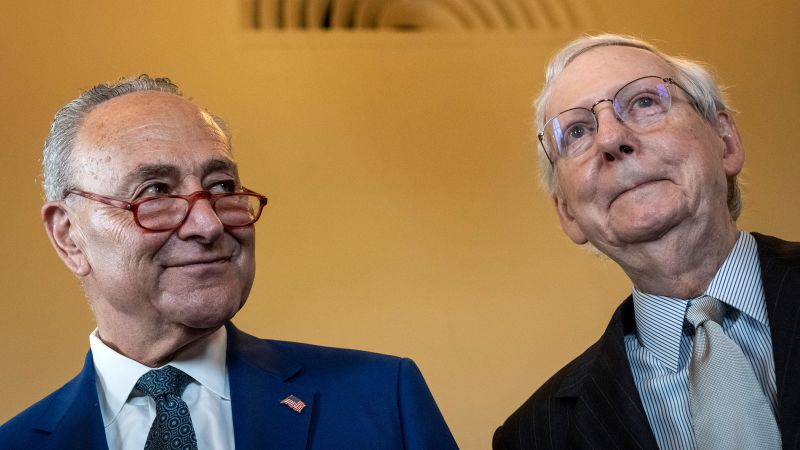Watch CNN Chief Congressional Correspondent Manu Raju’s interview with Senate Majority Leader Chuck Schumer this Sunday at 11 a.m. ET/8 a.m. PT on CNN’s “Inside Politics”.
CNN
—
Senate Majority Leader Chuck Schumer told CNN that his chamber might have to take matters in its own hands and push through a must-pass bill to fund the government amid deep divisions in the House and a looming shutdown by next weekend.
For weeks, Democratic and Republican senators have been watching the House with growing alarm as Speaker Kevin McCarthy has struggled to cobble together the votes to pass a short-term spending bill along party lines – all as he has resisted calls to cut a deal with Democrats to keep the government open until a longer-term deal can be reached. The initial plan: Let McCarthy get the votes to pass a bill first before the Senate changes it and sends it back to the House for a final round of votes and negotiations.
Now with House GOP leaders still struggling to get the votes ahead of the September 30 deadline, Schumer said he would try to cut a deal with Senate Minority Leader Mitch McConnell and send it to the House on the eve of a potential shutdown – all as he signaled he was pushing to include aid to Ukraine as part of the package.
“We may now have to go first … given the House,” Schumer told CNN in an interview in his office, moments before he took procedural steps to allow the Senate to take up a continuing resolution, or CR, as soon as next week. “Leader McConnell and I are talking and we have a great deal of agreement on many parts of this. It’s never easy to get a big bill, a CR bill done, but I am very, very optimistic that McConnell and I can find a way and get a large number of votes both Democratic and Republican in the Senate.”
If Schumer’s assessment is correct, that would leave McCarthy with a choice: Either ignore the Senate’s bill altogether or continue to try to pass his own bill in the narrowly divided House where he can only afford to lose four GOP members on any party-line vote.
But McCarthy could also be jammed by a bipartisan group of members who are openly threatening to sign a petition forcing a vote in the House – if they get 218 supporters – and circumvent the speaker altogether. At the moment, McCarthy is scrambling to resurrect his spending plans to try to move 11 year-long funding bills through his chamber – even though it typically takes months to hash out differences between the two chambers on spending legislation.
There’s now talk in House GOP circles about focusing solely on those long-term bills and abandoning a stop-gap resolution altogether, as hardliners threaten to tank it, and as GOP Rep. Matt Gaetz of Florida has vowed to seek McCarthy’s ouster as speaker if he pushes for such a Band-aid solution. But McCarthy indicated he’s still open to passing a Republican stop-gap bill, and he was non-committal on Friday on how he would handle a plan sent to him by the Senate.
It remains to be seen what will ultimately be included in the Senate’s plan. Schumer said in the interview “I hope so” when asked if he expected Ukraine funding to be included as the White House has pushed for $24 billion to aid the country in its war against Russia.
“Leader McConnell and I are both strongly for aid for Ukraine, and I believe the majority of the members of both parties in the Senate agree with that,” Schumer said.
But pushing such a plan quickly through the Senate will be difficult. Any one senator can slow down action in the Senate – and Sen. Rand Paul, a Kentucky Republican – has vowed to battle a bill that provides money for Ukraine.
“I’ll object to sending any more money to Ukraine,” Paul told CNN on Thursday. “We don’t have any more money.”
Yet with the GOP divisions over how to proceed, frustration is growing in the ranks.
Sen. Shelley Moore Capito of West Virginia, a member of Senate GOP leadership, raised concerns about her party’s handling of the spending talks.
“I feel like we have control of the House – I don’t envy my good friend Kevin McCarthy’s position here – but I think we’re just showing that we don’t have any solutions,” Capito told CNN. “Stalemates and government shutdowns are not good solutions.”
Asked if she were concerned about the fallout of a shutdown, Capito said: “I do worry about that, the political backlash.”
The conversations between the Senate leaders come as House Republicans have no clear path to a solution to extend funding past the critical September 30 deadline.
McCarthy said on Saturday he still lacks support from a handful of GOP hardliners to put a Republican stopgap measure on the floor next week. He is expected to hold a call with GOP members Saturday afternoon as they work against the tight timeline – though many of the hardliners appear to be unshakeable.
McCarthy sent House members home for the week on Thursday without any evident plan to avoid the looming shutdown after hardliners in the Republican conference once again scuttled his spending plans and dramatically bucked GOP leadership on a procedural vote over a Pentagon funding bill. Members are expected to return to session on Tuesday.
The vote was another blow to McCarthy, who is under mounting pressure and has faced threats of an ouster. This week, McCarthy has been briefing his conference on new plans to keep the government open and attempting to win over wary members on his right flank who revolted over a previous proposal he had hoped to approve this week.
Government funding expires at the end of the day on Saturday, September 30, when the clock strikes midnight and it becomes October 1, which marks the start of the new fiscal year. If Congress fails to pass legislation to renew funding by that deadline, then the federal government will shut down at midnight.

